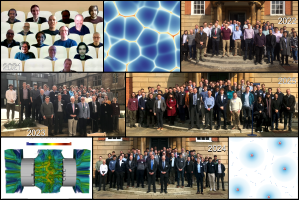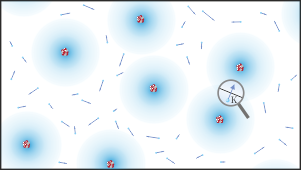News
See below the latest updates from the Oxford Centre for High Energy Density Science.
Group highlight

23 October 2025
OxCHEDS secures renewed AWE support
The funding contract between OxCHEDS and AWE has been extended for a further five years.
Research highlight (HEDLine)
 24 May 2024
24 May 2024
Current or count: why quantifying ionisation isn't as simple as it sounds
First-principles calculations suggest the 'ionisation' measured by x-ray Thomson scattering is not necessarily the same 'ionisation' that appears in simplistic atomic models.
Who we are
The Oxford Centre for High Energy Density Science (OxCHEDS) brings together research groups from across the Atomic and Laser Physics subdepartment (and beyond) with an interest in the study of matter under extreme temperature and pressure conditions.
Within Oxford, the centre is composed of the following six academics and their respective groups:
- Professor Justin Wark (Director of OxCHEDS)
- Professor Gianluca Gregori
- Professor Simon Hooker
- Professor Peter Norreys
- Professor Steve Rose
- Professor Sam Vinko
The OxCHEDS consortium also includes a number of national partners (in particular, AWE Aldermaston) in addition to a network of international collaborators.
What we do
At OxCHEDS, we study the behaviour of matter at the kinds of extraordinary temperatures and pressures usually encountered only in planetary or stellar interiors. With the aid of high-power lasers, we are able to generate exceptionally hot and dense matter (often found in the plasma state) in the laboratory, and to examine it, often using ultrafast x-ray scattering techniques made possible by fourth-generation light sources. This allows us to study matter under stellar-core or even supernova-explosion-like conditions, to develop novel plasma accelerators, to ignite controlled nuclear fusion reactions, to compress solid matter to incredible densities, and to explore exotic high-field physics that manifests only at exceptionally high energy densities.
HEDLines
HEDLines showcases interesting and important high-energy-density research carried out within OxCHEDS and its partner research groups. Each HEDLine summarises the research undertaken in 500 words or fewer. Research areas covered include plasma accelerators, laboratory astrophysics, inertial confinement fusion, dynamic compression, and high-field physics.
Want to know what OxCHEDS is up to? Then look no further!
